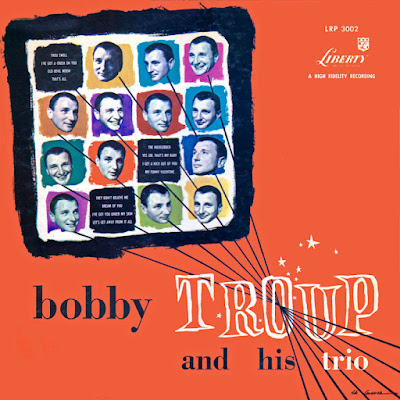His 1955 sojourn produced the 10-inch Songs of Bobby Troup, which was soon subsumed into the 12-inch Bobby Troup Sings Johnny Mercer, and then another 12-incher, The Distinctive Style of Bobby Troup.
I have both/all three for you today, plus a bonus. These are a follow-up to my recent post of Bobby's Capitol recordings and his first Liberty LP.
The Songs of Bobby Troup / Bobby Troup Sings Johnny Mercer
Troup had his last session for Capitol in September 1954. On January 27, 1955 he recorded a "live" date for the stillborn Nocturne label that eventually came out as his first Liberty LP. The very next day he was in the studio to tape his initial effort for the Bethlehem label.
For the Bethlehem session, Bobby programmed songs associated with his mentor, singer-songwriter Johnny Mercer. I say "associated with" Mercer because two of the songs had no vocals, and Mercer only wrote the lyrics for them. (They are "Laura" and "Jeepers Creepers," with music written by David Raksin and Harry Warren, respectively.) For the LP, Mercer and Troup collaborated on a new song, the excellent "I'm with You."
Troup is in good voice for the session, although his pitch was at times errant, particularly in "(Love's Got Me in a) Lazy Mood." The standout numbers are the less-often-heard "Cuckoo in the Clock" and "Jamboree Jones," both highly amusing. The latter is the only song on the LP for which Mercer wrote music and lyrics. Mercer had a gift for this type of material, not to say he wasn't versatile, as his songs with Harold Arlen demonstrate. "Come Rain or Come Shine," "That Old Black Magic" and "One for My Baby (and One More for the Road)" are included here.
For some reason, Troup also programmed the awful "Midnight Sun," with its repetitive melody line and flossy imagery, in place of the many other wonderful Mercer songs.
 |
| Bobby Troup and Johnny Mercer |
Bethlehem handled the release of this material in a peculiar manner. In May 1955 it issued eight of the songs in a 10-inch LP , titling it The Songs of Bobby Troup. This was despite the fact that Troup wrote only one of the songs ("I'm with You"), and that one was misattributed on the cover to Robert Allen and Al Stillman, who had written another song with the same title a few years earlier. Shirley Hoskins Collins (then wife of DJ Al "Jazzbo" Collins) wrote the discursive liner notes, which mention Mercer only in passing as a mentor of and influence on Troup. Burt Goldblatt's moody scrub grass cover could hardly be less appropriate to the contents of the LP.
In his article Bobby Troup on Record, 1948-55, James Harrod says that Troup's ensemble recorded four more Mercer songs on July 9 to fill out the 12-inch LP - "Lazy Mood," "Day In, Day Out," "Come Rain or Come Shine" and "Jamboree Jones."
Bethlehem retitled the 12-inch version Bobby Troup Sings Johnny Mercer. The Collins notes were gone, replaced by Mercer notes in verse, which are entirely about the songs and mention Troup only briefly (as his collaborator on "I'm with You"). Goldblatt scrubbed the scrub grass in favor of a weird if striking dual portrait of Mercer and Troup eating each other's faces.
As usual with these dual 10-inch/12-inch releases, I've transferred the 10-inch LP, then added the four new songs from its bigger sibling. The 12-inch LP was mastered a quarter-tone sharp, which I've corrected.
The Distinctive Style of Bobby Troup
Troup and his quartet, with Enevoldsen on bass, were back in the studio in August 1955 to tackle the 12 songs that were to appear on his LP The Distinctive Style of Bobby Troup. All are standards, half by Rodgers and Hart, two by the Gershwins, one by Kern, and one from Martin and Blane. The final selection was "The Gypsy in My Soul" by Clay Boland and Moe Jaffe.
The latter song has an interesting history and connection to Troup, unmentioned on the cover. Boland and Jaffe wrote the song for the 1937 University of Pennsylvania Mask and Wig Show. This could have been when Troup was a Penn freshman, and it's possible that he saw or performed in the show. His own tune "Daddy," which led to his early fame, came from the 1938 Mask and Wig Show. Despite his hipster façade, Troup was a prep school grad and became Phi Beta Kappa at Penn's Wharton School.
 |
| Troup at the piano |
By this time, Bethlehem's covers had been turned over to a certain Hannan, but again the artist did Troup no favors, rendering him as cross-eyed, moon-faced and orange-skinned.
Bonus - Julie London's Brief Bethlehem Career
Troup's protégé and future wife Julie London recorded four songs for Bethlehem before she departed for Liberty records and immediate fame via her single release of "Cry Me a River."Bethlehem issued London's four songs on a 1956 EP, after her chart success with Liberty, and on a compilation LP, Bethlehem's Girl Friends. You'll find the four songs in a new post over at my other blog.


















